VENEZUELA: A PSYCHOSOCIAL PERSPECTIVE
by Mireya Lozada | Translated by Daniel Esparza | Venezuelan street propaganda and cultural imagery by the photo journalist Federico Parra
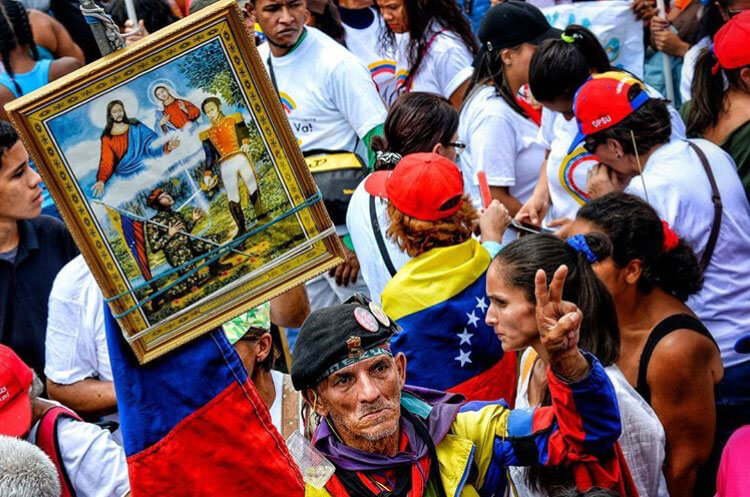
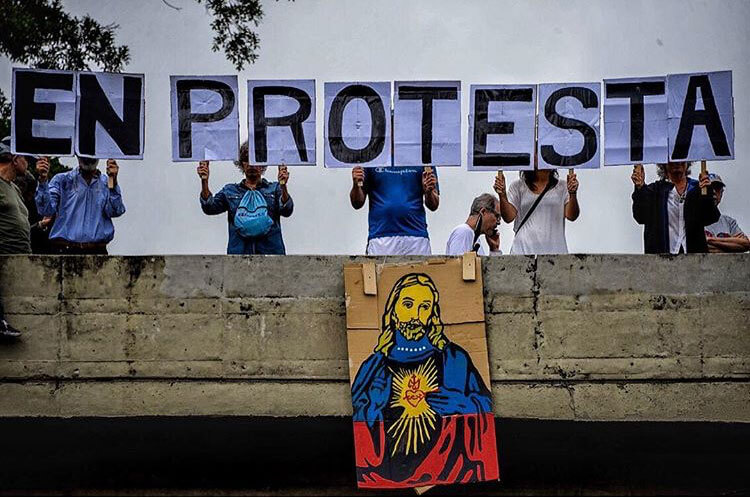
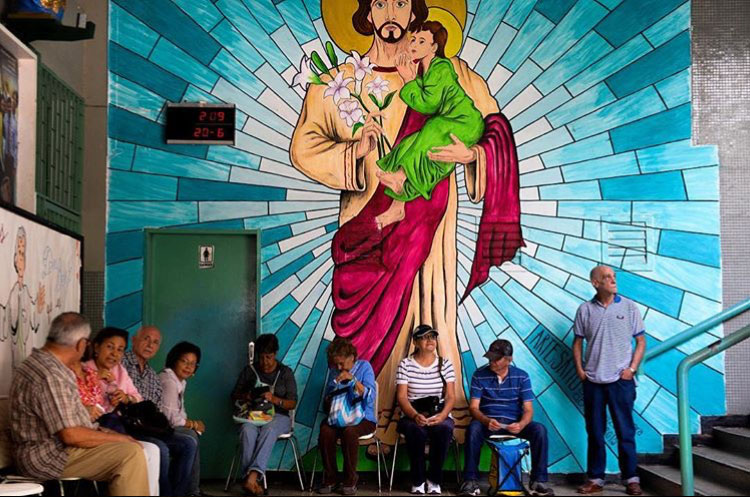
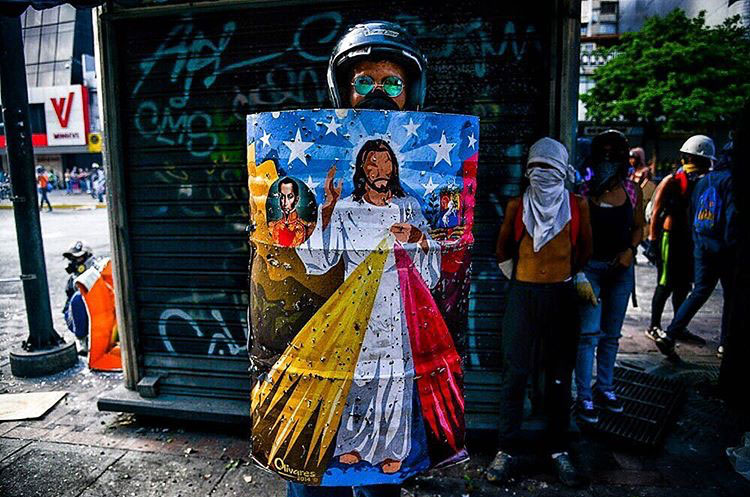
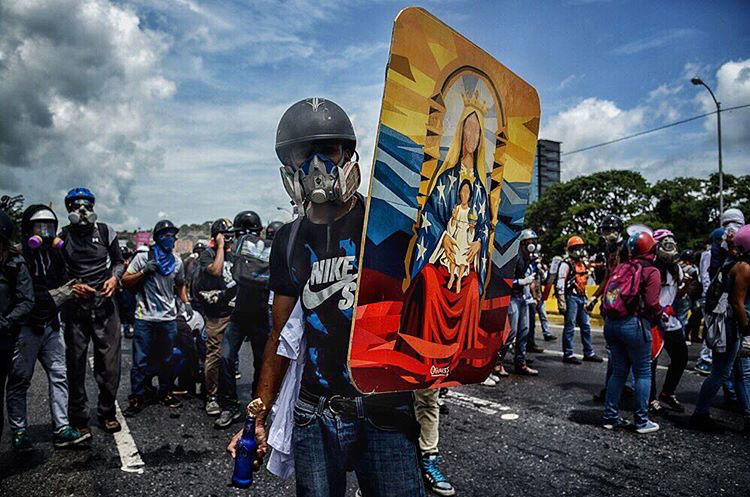
My country has sunk into a complex humanitarian crisis led by a corrupt autocracy. From the laments of the millions of migrants who comprise the Venezuelan exodus around the world, to country-wide demands for food, medicine, and basic services, to the denunciations of human rights violations and the cries of political prisoners, Venezuela is in grave decline.
Ever since Chávez attempted a first coup in 1992, the same questions have been posed from different perspectives and disciplinary fields: How did we get here? Why is Venezuela, praised for its conviviality, solidarity, and pacifism, now facing such conflicts? What are the socioeconomic and political roots and the sociocultural factors that have brought us to this state of crisis? How can the country with the biggest oil reserves in the world also register the highest poverty, inflation, violence, impunity, and insecurity indexes? When did the “paradigmatic” Venezuelan democracy lose its north? Is this the end of the democratic dream? In this essay, I intend to tackle these questions from a psychological perspective.
Explanations to our prolonged and exceptional crisis have revolved around economic variables, corruption, and impunity; around institutional frailty and the delegitimization of the party system; and around the transformation of the democratic State into a failed, Mafia-led one. Other analyses point at the fundamental role of what has been called the “Magical State” (Coronil, 2002). Just because Venezuela is sitting on the biggest oil reserves in the world, the fantasy has been that we only need to drill it out and distribute the income to create an ideal economy in an ideal democracy. It’s our magical solution.
Now, again, we face the developmental illusion of swift change and progress derived from this allegedly providential, “magical” oil-producing state. This time the illusion is translated into a populist promise that is unable to distinguish democracy from dictatorship. Now again, Venezuela is worshipping oil — the so-called devil’s excrement; mene, in native wayuunaiki — that oily bitumen flowing from the bowels of the earth, the almighty modern black gold which has configured and signified the Venezuelan way to do and undo. Just like in the Venezuelan northeast (one of the main oil-producing regions in the country) where people sing songs to Saint Benedict the Black (Saint Benedict of Palermo) asking him for health and prosperity, it can be argued that the whole country is faithfully hoping that the oil revenues — whether if mortgaged or sold to liberal and communist empires — will provide for all its needs. The fact is, Venezuelans often refer to the oil industry as “the oil-filled breast that nourishes the motherland” (la teta petrolera que sostiene la patria). Chávez simply embodied this very same all-solving, all-nourishing, magical, divinized understanding of the state in his own charismatic caudillo figure.
So we can see that a complex amalgam of oil dependence and political personalism defines the axes on which Venezuelan politics revolve. The revolution, which was either backed up or questioned by local and global resistance groups, quickly assumed a media-fake-news-2.0-formatted spectacle. A new, unequal, and fragmented geometry of power was configured by concentrating the fundamental powers of the state, authoritarian preaching, and the intervention of economy and public opinion in the name of socialism.
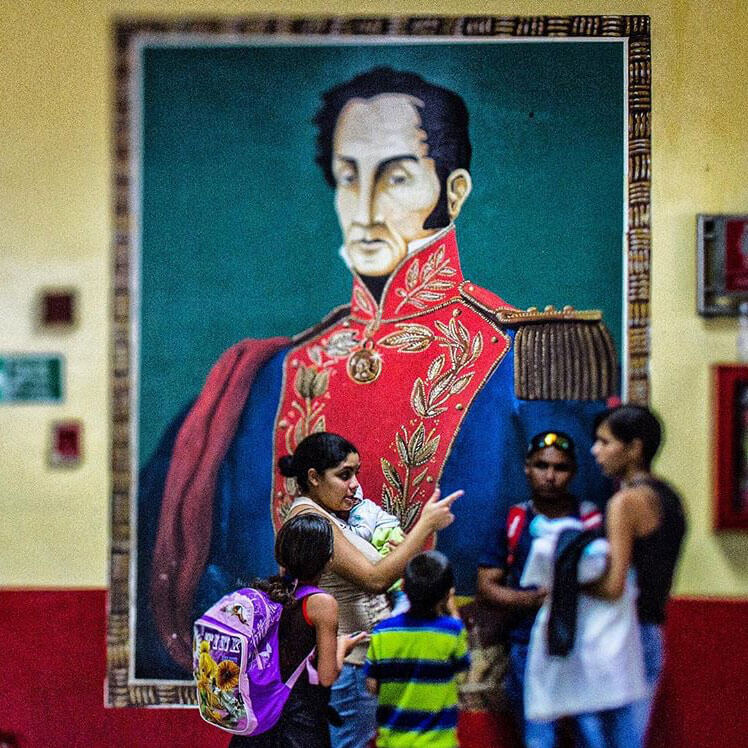
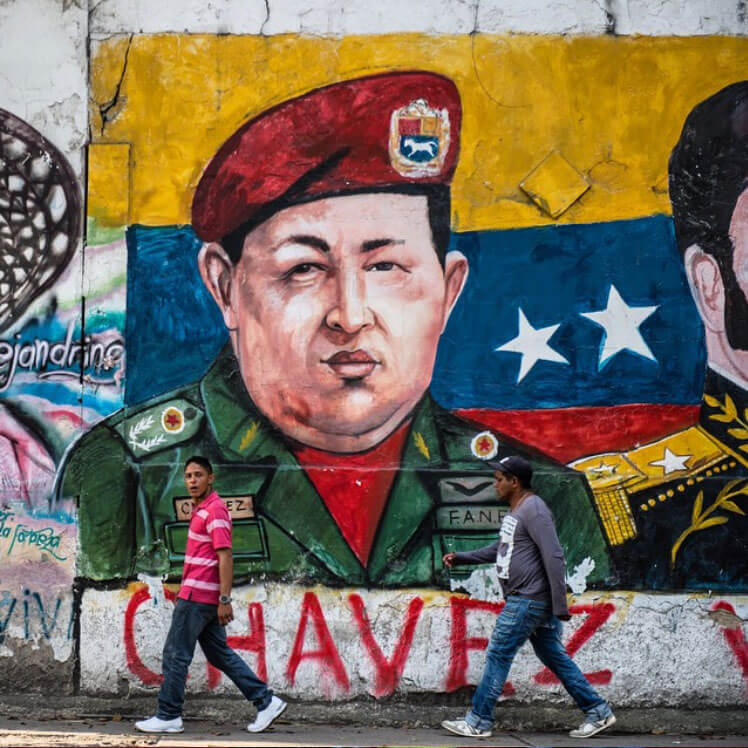
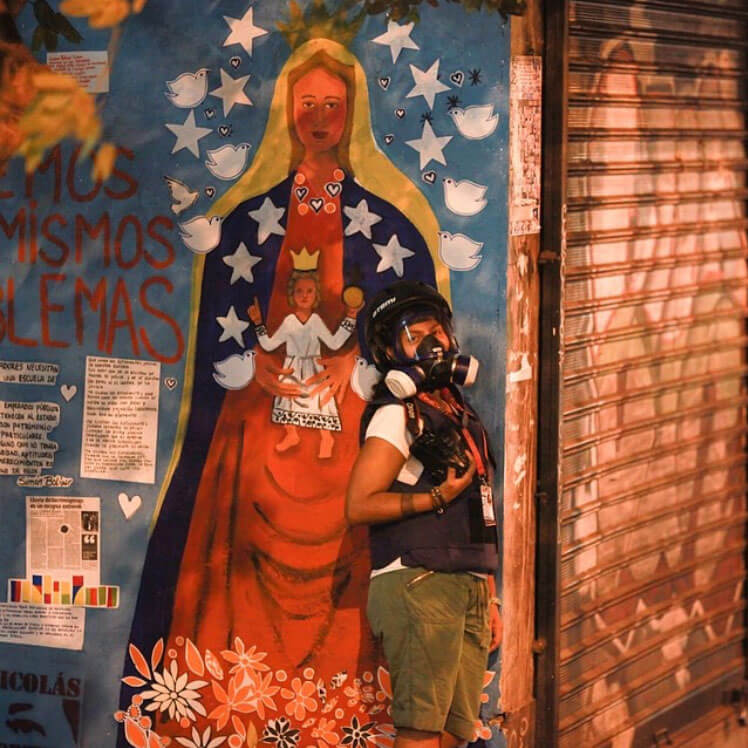
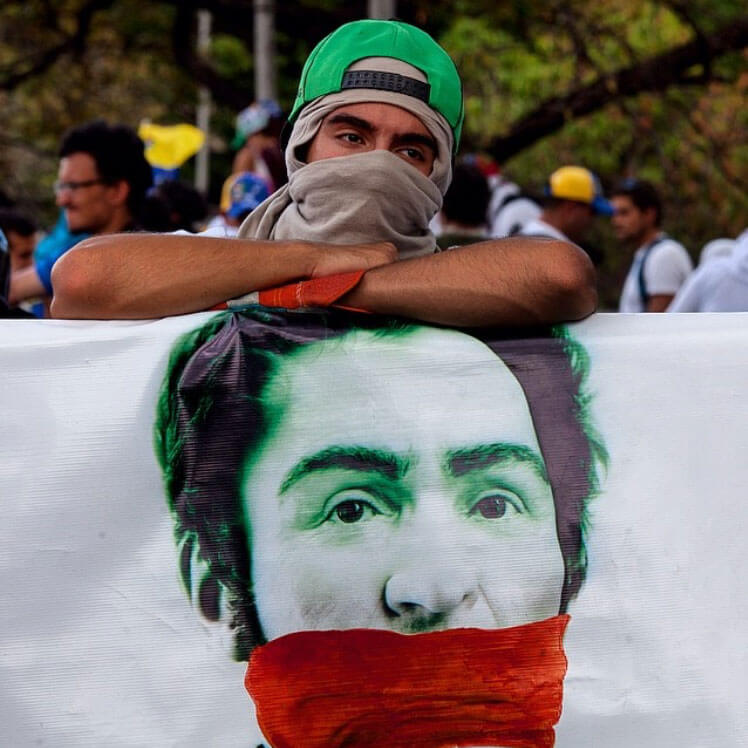
For twenty years, against the background of this conflictual sociopolitical context, we have also experienced acute social polarization. This polarization has led to the silencing and the elimination of political adversaries. (Lozada, 2014) The fundamental differentiation between “us” and “them” has been used as an effective instrument of political and social control performed by groups politically at odds with each other: the pro-government “chavistas” and the opposition “antichavistas,” as well as a third group often referred to as “Ni-Ni” (“neither-nor,” “not with the government, nor with the opposition”).
These three groups, so at odds with each other, emerged out of the same socially shared beliefs and values. The fact of their common psychosocial origins, however, seems to escape all notice. Instead, deeply held beliefs and values are employed as political instruments to legitimize new leaders in contexts of social exclusion. Of course, in these weaponized contexts, the democratic principles of equality, liberty, and justice — the very principles that guide the direction and empower social change — cannot be achieved.
Today there are new groups fighting for recognition, for equality, and for justice. In the midst of the progressive loss of basic human rights and the loss of individual and collective identities, these groups are trying to formulate new ethical standards that can be applied to politics and power and give some kind of direction to the country.
The collective cultural, historical, and common references — along with longstanding institutions and basic community values — all play a vital part in what we can call, following Castoriadis, the “social imaginary.” In Venezuela, the “social imaginary” sharply transformed after Chavez came to power.
In a famous essay called “From the Goof Motherland to Bolivarian Theology” (“De la Patria boba a la teología Bolivariana”) the Venezuelan lawyer, philosopher, and essayist Luis Castro Leiva explained how, before Chavez, Bolivarianism was the religion of the motherland. Simón Bolívar, one of the main leaders of the Venezuelan independence wars in the nineteenth century, was revered along with our Lady of Coromoto — the Catholic patroness of the country — and Marcos Pérez Jiménez — the military dictator who turned Venezuela from a mainly rural country into a modern, urban country. These three figures comprised the classic Venezuelan trinity.
Chavez perverted this classical social imaginary. Calling his take over of Venezuela the “Bolivarian revolution,” Chavez positioned himself the new Perez Jimenez.
I would like to think about historical psyche from a psychosocial perspective. As mental professionals, perhaps we can rethink these discourses and their relationships with subjective elements that make democratic social life possible. From my point of view, as a psychologist, these questions grow exponentially: What is the role of imaginary and illusory components that seem to constitute an important part of our collective psyche, in the construction of our institutions? How can we recognize this symbolic, magic, affective substrate in Venezuelan politics, and the social function it plays in processes of social control or liberation? What role does social polarization and unrest play in the construction of new, commonsensical social imaginaries built on a shared sense of direction? How can we dismantle our collective delusions, given our recent historical experience, avoiding the idealization of civilian and military leaders? How can we recognize the multiple divinities and myths populating our secularized society? How do we do this without imposing the rationality of an alleged logic that denies the role myths play in the structuring of historical memory and the social construction of reality?
Years and years of conflict have left Venezuelans thinking about the other only as a political enemy. Hence, the urgency of allowing and facilitating the psychosocial process of a construction of a non-hostile alterity, in which the images of the other are constituted in a socially inclusive — and not antagonistic — representation.
The thread woven between the theological and the political, integrating the profane and the messianic, produces chieftain-like leaderships and political projects that undermine democracy.
It’s not about demystifying or eliminating illusions and myths but rather about understanding the meaning mythical thought gives to the construction of social life and articulating what religion and ideologies bring to psychosocial and sociocultural processes. Perhaps by critically inquiring into our shadows and absences, we might also celebrate the forms of cultural resistance that allows us to collectively heal our country so heroes and saints can come to re-occupy their rightful place outside of politics.
This is the dream that encourages me. ■
-
Mireya Lozada, PhD, is the coordinator of the Political Psychology Research Unit in the Psychology Institute of the Central University of Venezuela (UCV). For the last twenty years, she has worked in peace-building programs and promoted psychosocial accompaniment programs with different sectors of the population affected by the impact of polarization and sociopolitical conflict.
-
Email: mireyaloza@gmail.com
-
Castoriadis, C. (2001) Figuras de lo pensable: La encrucijada del laberinto VI, Buenos Aires, Fondo de Cultura Económica.
-
Castro Leiva. L. (1991). De la patria boba a la teología bolivariana. Caracas: Monte Ávila Editores.
-
Coronil, F (2002) El Estado mágico. Naturaleza, dinero y modernidad en Venezuela. Caracas: Consejo de Desarrollo Científico y Humanístico. Universidad Central de Venezuela, Nueva Sociedad.
-
Lozada, M. (2014). Us or Them? Social Representations and Imaginaries of the Other in Venezuela Papers of Social Representations. V. 23. http://psych1.lse.ac.uk/psr/PSR2014/2014_1_20.pdf
- Venezuelan street propaganda and cultural imagery by the photo journalist: Federico Parra | Instagram: @FedericoParra
ROOM is entirely dependent upon reader support. Please consider helping ROOM today with a tax-deductible donation. Any amount is deeply appreciated. |





